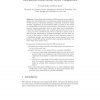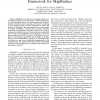66 search results - page 1 / 14 » Parallel Reducibility for Information-Theoretically Secure C... |
CRYPTO
2000
Springer
13 years 9 months ago
2000
Springer
Secure Function Evaluation (SFE) protocols are very hard to design, and reducibility has been recognized as a highly desirable property of SFE protocols. Informally speaking, reduc...
CORR
2008
Springer
13 years 4 months ago
2008
Springer
We present three voting protocols with unconditional privacy and information-theoretic correctness, without assuming any bound on the number of corrupt voters or voting authorities...
DCOSS
2008
Springer
13 years 6 months ago
2008
Springer
We consider a mobile sensor network monitoring a spatio-temporal field. Given limited caches at the sensor nodes, the goal is to develop a distributed cache management algorithm to...
ACSAC
2009
IEEE
13 years 11 months ago
2009
IEEE
—MapReduce has become increasingly popular as a powerful parallel data processing model. To deploy MapReduce as a data processing service over open systems such as service orient...
CRYPTO
2005
Springer
13 years 10 months ago
2005
Springer
We study the question whether the sequential or parallel composition of two functions, each indistinguishable from a random function by non-adaptive distinguishers is secure agains...


